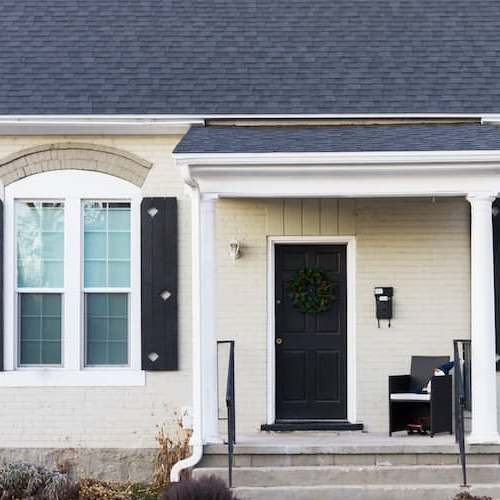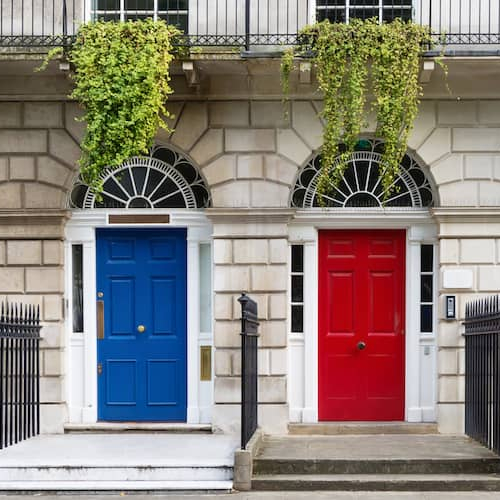Buying a second home with a VA loan
Contributed by Tom McLean
Aug 22, 2025
•8-minute read

Those who have completed eligible military or other qualifying public service, or the surviving spouse of someone who has, may be eligible for a VA loan. These loans from the Department of Veterans Affairs have the major benefit that there’s usually no required down payment.
Although they’re meant to be used for buying a primary residence, it’s possible to use a VA loan for a second home under specific circumstances.
Can you use a VA loan for a 2nd home?
Using a VA loan to buy a second or vacation home is possible for those who have met the service requirements or are an eligible surviving spouse of a veteran. However, because they’re meant to be used to buy or refinance a primary residence, you have to strictly follow the occupancy rules for VA loans.
A primary residence is a home you live in for the majority of the year, while a vacation home is one you live in on a part-time basis. An investment property is a home that you don’t live in and own primarily to make money by flipping it or renting it out.
Under the VA occupancy rules, you have to occupy the home as your primary residence within 60 days of closing the loan. There are exceptions for homes undergoing renovation, active service members, or VA-eligible borrowers buying a retirement home within a year of their retirement date.
This can complicate things for those looking to purchase a second home or investment property, but there are ways to accomplish this goal.
Examples of buying a second home with a VA loan
Let’s run through several scenarios in which you can use your VA loan entitlement more than once.
If your first home is paid off
When you buy a home with a VA loan, your loan is based on your VA entitlement. If you’ve paid off your first VA loan, you can do a one-time entitlement restoration.
Once during your lifetime, you can have the entitlement you used to buy your previous home restored without selling it to buy another home with a VA loan. Under this scenario, the new property would become your primary residence. The paid-off home then becomes your vacation home, and you only have one mortgage payment.
If your first home isn’t paid off
If your first home isn’t yet paid off, you still may be able to use a VA loan to buy a second home. If you’re still making payments on your first home or it was foreclosed on, you may have a partial entitlement, which means you might need a down payment.
By taking a second VA loan, you must occupy the new property as your primary residence. This means moving out of your prior residence, which will now serve as your vacation home. The VA has no rules regarding the minimum length of time the house must be the primary residence, but most lenders require at least 1 year of occupancy.
If you plan to sell your first home
The most common way to have your entitlement restored is to sell your home. If you do this, you could buy a new primary residence with a VA loan and get a second or investment property with a conventional loan.
But if you find a buyer who’s eligible for a VA loan, there’s a special benefit you can offer: VA loans are an assumable mortgage. This means you have the option of letting the buyer take over your existing VA loan. This could be attractive to the buyer if current market rates are higher than they were when you took out your VA loan.
Although you could do this with any borrower, if someone who’s not eligible for a VA loan under normal circumstances assumes your loan, you lose your VA entitlement. However, if you find a buyer who is already eligible for a VA loan, they can exchange your entitlement for theirs on the loan. Your entitlement is restored.
VA entitlement
VA entitlement refers to the amount of your loan that the VA will guarantee for your lender if your home is foreclosed upon. This is important because the VA only guarantees up to 25% of the loan amount, so this helps determine whether and how much of a down payment you need.
You’ll find your VA entitlement on your Certificate of Eligibility (COE), which also verifies your eligibility for VA benefits. There are two types of entitlement: basic and bonus.
Basic entitlement guarantees up to $36,000 are available to lenders for loan amounts of up to $144,000. Because you would generally have a difficult time finding a house in most areas of the country for that amount, there’s also a bonus entitlement.
If your COE basic entitlement is $36,000, you have full entitlement. For those with full entitlement, the VA sets no loan limit, although lenders may establish their own.
Using a VA loan for an investment property
Although you can’t use a VA loan to purchase a home for initial use as an investment property, there are some methods you can use to make investment income within the rules.
As long as you occupy the property as your primary residence for the minimum amount of time specified in your mortgage contract, you can convert a home bought with a VA loan into an investment property and use the rental income to qualify for another loan. You may have to make a down payment.
If you’re getting another VA loan, the rental income is specifically meant to offset the mortgage payment. You need a fully executed lease agreement and a 1007 or 1025 appraisal report. A 25% haircut is applied to the rent to account for vacancies between renters.
House hacking may be a little bit more straightforward. The VA allows you to buy a home with up to four units. You use one unit as your primary residence and rent out the other three. It’s not technically using a VA loan for an investment property, but you’re making investment income.
Using a VA loan for a vacation home
As we’ve said, it’s not possible to directly buy a vacation home with a VA loan. However, you can consider purchasing another primary residence and converting your previous primary residence into a vacation home.
As part of this process, you generally have 60 days to make the new home your primary residence, but there are exceptions. Your spouse can occupy the home in your stead if they are on the loan. But there’s an exemption to occupancy requirements for active-duty military, so you can also buy a home as a single soldier.
There also is more flexibility in terms of move-in date if you intend to return to the property after finishing your tour of duty. You must have a retirement date in this case.
Understanding bonus entitlements
Bonus entitlement determines how much the VA will pay if the loan amount exceeds $144,000. Again, if you have full entitlement, the VA itself doesn’t set loan limits, although lenders may do so themselves. Full entitlement usually means no down payment. Where things get more complicated is with partial entitlement.
We’ll discuss all things entitlement below, but keep in mind that even if you don’t have a down payment, there may be other closing costs, including the VA funding fee.
Example of partial entitlement
If you have a partial entitlement, you may have to make a down payment to buy a home with a VA loan. The first thing to do is to check your COE. If it shows used entitlement, you only have partial entitlement. If it shows you have $36,000 entitlement available, you have full entitlement.
When a client has partial entitlement, the VA guarantees the lower of 25% of the loan amount or 25% of the county conforming loan limit minus the client’s used entitlement.
For example, Joan wants to buy a $480,000 house in an area with a conforming loan limit of $806,500. She’s used $100,000 of her VA entitlement in the past, which hasn’t been restored.
For the first equation, let’s take a look at 25% of the local loan limit minus the unrestored entitlement:
$806,500 × 0.25 - $100,000 = $101,625
Now, let’s take a look at the other option, which is strictly 25% of the loan amount.
$480,000 × 0.25 = $120,000
The VA takes the lower number from these two equations, so they’ll guarantee $101,625. Because most lenders, including Rocket Mortgage®, require that the combination of any down payment and VA guarantee covers a minimum of 25% of the loan amount, Joan might have to make a down payment of $18,375 ($120,000 - $101,625).
Because of this rule, it’s important that you make sure your entitlement is restored if you sell your previous property. However, the process isn’t automatic. You must apply for restoration after selling your property.
Example of partial entitlement in a high-cost area
In the case of the highest-cost counties, loan limits are set at the county level. They can go as high as $1,209,750 for a 1-unit property.
Here’s how it pencils out if Joan wants to buy a $900,000 home in an area with $1,209,750 loan limits and $100,000 in previously used entitlement.
Remember, the first equation is 25% of the county loan limit minus any existing used entitlement:
$1,209,750 × 0.25 - $100,000 = $202,437.50
The second equation is the loan amount times 25%:
$900,000 × 0.25 = $225,000
Because the VA covers the lower amount of the two equations, she would have to come up with a $22,562.50 down payment under the policies of most lenders.
Loan limits have no impact on a VA loan for someone with full entitlement who’s just trying to buy one house from a VA policy standpoint. However, lenders can set their own policies, and most have special requirements if the loan amounts reach a certain threshold.
Rocket Mortgage offers VA jumbo loans up to $1.5 million without a down payment if you have a median FICO® Score of at least 640. You can obtain a VA jumbo loan of up to $2.5 million with a 680 credit score and no down payment.
Restoring your entitlement
If you paid off an existing VA loan and want to use the benefit again, you can request a one-time restoration of your entitlement by essentially asking for a new Certificate of Eligibility. You can fill out Form 26-1880 online or have your lender request restoration on your behalf. They may be able to do so through an expedited process.
You can only do this once.
FAQ
Here are answers to common questions about buying a second home with a VA loan.
Will I have to put money down for a VA loan?
While there’s always the chance that lenders will have different policies, it’s likely that you’ll only have to worry about the potential for a down payment if you have partial entitlement.
What is the VA funding fee for a second home?
Depending on your down payment, the VA funding fee is between 1.25% – 3.3% of the loan amount for every VA loan after the first one. The higher the down payment, the lower the fee. For first-time borrowers, the fee is between 1.25% – 2.15%.
How many houses can I get with a VA loan?
There’s no set limit on the number of homes you can buy with a VA loan. While rules related to primary residences and personal entitlement apply, every time you sell your home and pay off your loan, your entitlement is restored, so you can keep doing it indefinitely.
How long do I have to wait to get a second VA loan?
Lenders have different policies regarding how long you must wait between taking out VA loans. Generally, if you’ve met the minimum occupancy period for your original loan, you could move forward. The exception would be cases of bankruptcy or foreclosure in which the waiting period might be as long as 2 years.
Can a veteran have two primary residences?
While it’s not possible to have two primary residences, you can convert a previous primary residence into a vacation home and buy another home with a VA loan. This is achieved through either a partial remaining entitlement or a one-time restoration of full entitlement.
The bottom line: Yes, you can buy two homes with a VA loan
To buy more than one home with a VA loan, you must buy a new primary residence and convert your previous home into a vacation home or investment property. You either do this with the remaining partial entitlement or a one-time restoration of your full entitlement if your previous loan has been paid off. With partial entitlement, local conforming loan limits often dictate whether a down payment is necessary.
If you feel confident you understand the options, you can apply for a mortgage online.Kevin Graham
Kevin Graham is a Senior Writer for Rocket. He specializes in mortgage qualification, economics and personal finance topics. Kevin has passed the MLO SAFE exam given to mortgage bankers and takes continuing education courses. As someone with cerebral palsy spastic quadriplegia that requires the use of a wheelchair, he also takes on articles around modifying your home for physical challenges and smart home tech. He has a BA in Journalism from Oakland University.
Related resources

9-minute read
VA Streamline refinance (VA IRRRL): What is it and how does it work?
A VA IRRRL may be the best option for you if you want lower monthly payments. Read our article to learn more about VA Streamline refinance and how it works.<...
Read more

5-minute read
A guide to VA construction loans
VA construction loans can help veterans and active-duty service members finance and build their dream home. Explore VA construction loans and how they work.
Read more

6-minute read
How many times can you use a VA loan?
There’s no limit to the number of VA loans qualified borrowers can take out, but you usually can’t hold multiple VA loans at once. Let’s break...
Read more